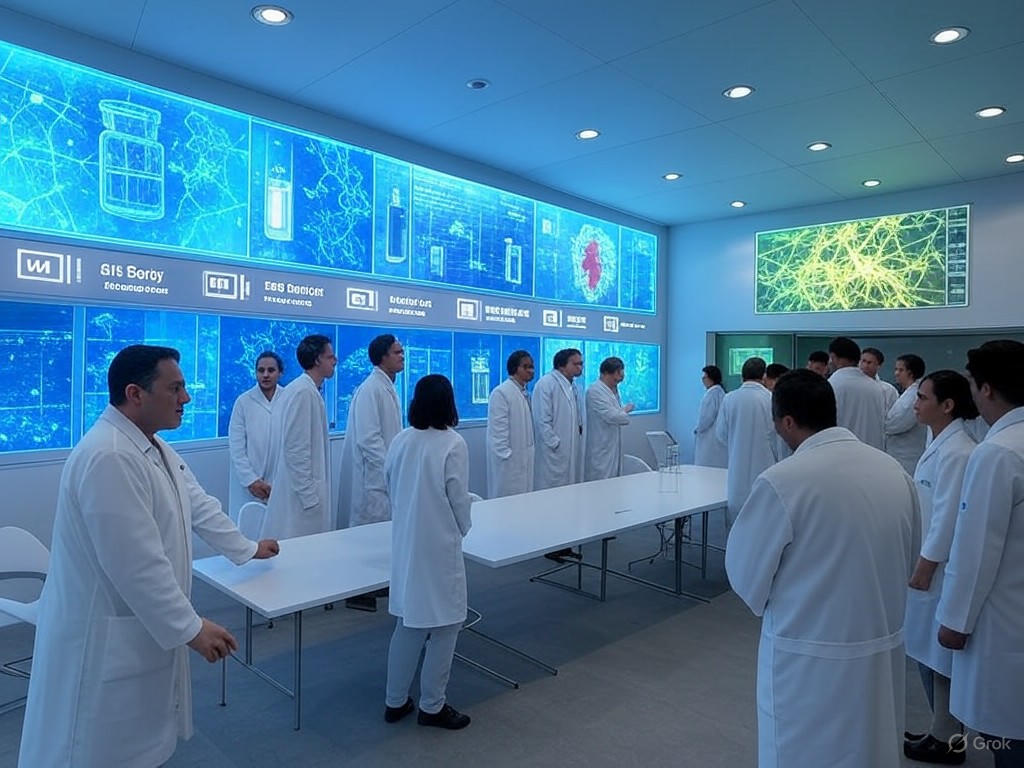AI-Driven Drug Discovery: Accelerating Medicine
In an era where the pace of progress often outstrips our capacity for astonishment, one cannot help but marvel at the audacious march of artificial intelligence into the hallowed halls of pharmaceutical research. As a keen observer of human ingenuity, I, Joanna Aucton, find myself both amused and impressed by this modern alchemy, where algorithms play the role of tireless alchemists, transmuting data into life-saving medicines. Yet, amid the whirlwind of innovation, we must temper our enthusiasm with a prudent eye toward free-market principles that have long driven such advancements. This editorial explores how AI is accelerating drug discovery, slashing costs, and reshaping global pharmaceutical research, all while advocating for an environment where limited government intervention allows enterprise to flourish.
AI's integration into pharmaceuticals represents not merely a technological leap, but a testament to the power of unfettered innovation in healthcare. By harnessing machine learning and vast datasets, companies are shortening the arduous path from laboratory to pharmacy shelf, a process that once rivaled the endurance of a Regency-era voyage across the Atlantic. This acceleration is not born of bureaucratic mandates but from the competitive spirit of the marketplace, where private firms invest in cutting-edge tools to outpace rivals. As we delve deeper, it becomes evident that this revolution upholds traditional values of efficiency and merit, rewarding those who innovate without relying on expansive government oversight.
The Mechanics of AI in Drug Discovery: A Swift and Savvy Alliance
At the heart of this transformation lies AI's ability to analyze complex biological data at speeds unattainable by human researchers alone. Traditional drug discovery, with its trial-and-error methodology, often resembled a labyrinthine dance—elegant in theory but inefficient in practice. Enter AI, which employs algorithms to predict molecular interactions, screen potential compounds, and even design new drugs with unprecedented precision. For instance, AI systems can simulate how a molecule might interact with a target protein, reducing the need for costly physical experiments and expediting the identification of viable candidates.
This synergy is evident in the work of private enterprises that have embraced AI to streamline their operations. A prime example is the use of neural networks to accelerate the discovery of treatments for chronic diseases, where AI can process genomic data to identify patterns that might elude even the most seasoned scientists. According to a detailed analysis by the Wall Street Journal, AI-driven platforms have cut development timelines by up to 50%, allowing pharmaceuticals to bring new therapies to market faster than ever before. Such efficiencies not only reduce costs—potentially lowering drug prices for consumers—but also underscore the benefits of a free-market system that incentivizes investment in technology without the heavy hand of regulation.
Yet, we must acknowledge the challenges that accompany this progress. Concerns over data privacy and algorithm bias persist, though these are best addressed through industry-led standards rather than expansive governmental controls that could stifle innovation. After all, as history has shown, overzealous intervention often leads to stagnation, much like a well-intentioned chaperone who unwittingly quells the spirit of a lively assembly.

This image depicts an AI interface visualizing complex molecular interactions, highlighting how computational models are accelerating the early stages of drug discovery and making pharmaceutical research more accessible to innovative firms.
Evidence of Transformation: Cost Reductions and Global Impact
The evidence for AI's revolutionary role in pharmaceuticals is as compelling as it is quantifiable. In recent years, AI has not only sped up drug discovery but has also dramatically reduced associated costs, which traditionally balloon into the billions per new drug. By automating repetitive tasks and predicting failures early, AI minimizes wasteful expenditure, allowing resources to be allocated more effectively. A study from IEEE Spectrum reveals that AI-assisted research has lowered the average cost of bringing a new drug to market by 30–40%, freeing up capital for further innovation rather than regulatory compliance.
Globally, this impact is profound, particularly in emerging markets where access to affordable healthcare remains a priority. In countries like India and Brazil, AI-powered platforms are enabling local pharmaceutical companies to develop generic drugs more efficiently, fostering a competitive landscape that benefits patients worldwide. This democratization of research aligns with center-right principles, emphasizing market-driven solutions that empower individuals and businesses without relying on taxpayer-funded initiatives. As noted in a report by McKinsey & Company, AI's role in pharmaceuticals could generate $100 billion in annual value by 2025, primarily through enhanced productivity in private sectors.
Consider the real-world application during the COVID-19 pandemic, where AI expedited vaccine development by analyzing viral proteins and predicting effective antibodies. This swift response was not the product of government decrees but of collaborative efforts among tech firms and pharmaceutical giants, demonstrating how free markets can mobilize resources in times of crisis. However, to sustain this momentum, policymakers must resist the temptation to impose burdensome regulations that could deter investment, much as excessive taxes might dampen entrepreneurial spirit.

This timeline illustration charts the evolution of drug discovery processes, from traditional methods to AI-enhanced workflows, underscoring the global acceleration in healthcare innovation driven by private sector ingenuity.
The Path Forward: Balancing Progress with Prudent Governance
In conclusion, the ascent of AI in drug discovery heralds a new epoch in pharmaceuticals, one where innovation, efficiency, and global collaboration converge to address pressing healthcare needs. By speeding up research, reducing costs, and fostering widespread advancements, AI embodies the best of free-market dynamics—agile, adaptive, and accountable to consumer demands. Yet, as with any technological advancement, vigilance is required. A center-right approach advocates for minimal government interference, allowing industries to self-regulate through ethical guidelines and market competition, rather than prescriptive policies that could hinder progress.
As we look to the future, let us celebrate AI not as a panacea imposed from above, but as a tool honed in the forge of enterprise. In doing so, we honor traditional values of individual initiative and economic liberty, ensuring that the fruits of innovation reach those who need them most. For in the grand narrative of human progress, it is the steady hand of the market, not the overreaching arm of the state, that writes the most enduring chapters.

